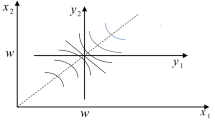Abstract
Where there are infinitely many possible basic states of the world, a standard probability function must assign zero probability to each state – since any finite probability would sum to over one. This generates problems for any decision theory that appeals to expected utility or related notions. For it leads to the view that a situation in which one wins a million dollars if any of a thousand of the equally probable states is realized has an expected value of zero (since each such state has probability zero). But such a situation dominates the situation in which one wins nothing no matter what (which also has an expected value of zero), and so surely is more desirable. I formulate and defend some principles for evaluating options where standard probability functions cannot strictly represent probability – and in particular for where there is an infinitely spread, uniform distribution of probability. The principles appeal to standard probability functions, but overcome at least some of their limitations in such cases.
Similar content being viewed by others
References
Carnap, R.: 1962, 'The Aim of Inductive Logic', in E. Nagel, P. Suppes and A. Tarski (eds), Logic. Methodology, and Philosophy of Science, Stanford University Press, Stanford.
de Finetti, B.: 1972, Probability, Induction, and Statistics, Wiley, New York.
Fishburn, P.: 1986, 'The Axioms of Subjective Probability', Statistical Science 1, 335–358.
Kadane, J., Schervish, M. and Seidenfeld, T.: 1986, 'Statistical Implications of Finitely Additive Probability', in P. Goel and A. Zellner (eds), Bayesian Inference and Decision Techniques, North Holland, Amsterdam.
Keisler, H. J.: 1976, Elementary Calculus, Prindle, Weber & Schmidt, Boston.
Koopman, B. O.: 1940, 'The Axioms and Algebra of Intuitive Probability', Annals of Mathematics, Ser. 2, 41, 269–292.
Levi, I.: 1980, The Enterprise of Knowledge: An Essay on Knowledge, Credal Possibility, and Chance, MIT Press, Cambridge, MA.
McCall, S. and Armstrong, D. M.: 1989, 'God's Lottery', Analysis 49, 223–224.
Robinson, A.: 1966, Non-Standard Analysis, North Holland, Amsterdam.
Savage, L.: 1972, The Foundations of Statisticism, Dover Publications, New York.
Seidenfeld, T., and Schervish, M.: 1983, 'A Conflict Between Finite Additivity and Avoiding Dutch Book', Philosophy of Science 50, 398–412.
Shimony, A.: 1955, 'Coherence and the Axioms of Confirmation', Journal of Symbolic Logic 20, 8–20.
Skyrms, B.: 1995, 'Strict Coherence, Sigma Coherence, and the Metaphysics of Quantity', Philosophical Studies 77, 39–55.
Vallentyne, P. and Kagan, S.: 1997, 'Infinite Utility and Finitely Additive Value Theory', Journal of Philosophy 94, 5–26.
Author information
Authors and Affiliations
Rights and permissions
About this article
Cite this article
Vallentyne, P. Standard Decision Theory Corrected. Synthese 122, 261–290 (2000). https://doi.org/10.1023/A:1005247705806
Issue Date:
DOI: https://doi.org/10.1023/A:1005247705806




